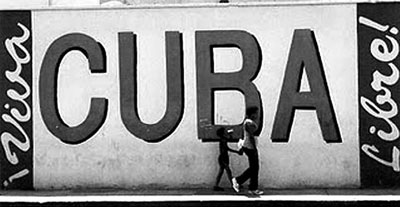
Of interesting things in the world they happen a lot, tell them all is impossible, but as it happens it is worth stopping for a moment to see what happens across the ocean, in places other than we're used to, but situations that may be presented by a libertarian aspirations similar to ours.
It is because despite the obvious dictatorship and repression attached, there are anarchists in Cuba and are trying seriously to understand how to act in the sensitive time ahead of them, because they sensed that the transitions can be a good time to throw away seeds of freedom in the hope that individuals sprout new, changed along with the history, who can assess the experience with the weight of the past and choose what they really want on the basis of egalitarian principles, and especially self-managed anti-authoritarian.
Daniel Pinos, a member of GALSIC, support for the Libertarian Party and independent trade unionists in Cuba, tells us the unfolding of the Social Forum organized by the Centre's critical network in Cuba, La Habana, on 26 and 27 March.
The first Social Forum organized on the island of Cuba has not had, contrary to the forums organized in other countries, any institutional support. The critic Observatory network, who was the organizer of this event, has faced a couple of days before a series of obstacles created on purpose to prevent its realization. It was anticipated that it took place at the cultural center Mejunje, Santa Clara, but the authorities have pressured the director of the Center for the cancellation of the authorization. Fortunately, the imagination of the organizers helped to overcome the logistical obstacles and the meeting finally took place on 26 and 27 March in a lush garden in the marginal neighborhood of extraordinary Coco Solo de Marianao, on the outskirts of Havana. A friendly place to be the garden of a private home, the family of Perez, who is also the headquarters of the cultural project Coco Solo Social Club, inspired by the Cuban playwright Manuel Martínez. It's in this context that more than sixty social activists, writers, artists, cultural workers, researchers, journalists, bloggers and community leaders gathered to discuss the current Cuban and world revolutionary outlook, to make proposals for change and for social emancipation. The Forum was organized by the International Group of anti-capitalism, of the emerging new realities and the Laboratory Vivir la Revolucion.
This annual event was organized by the critical Centre for the first time in a totally self-management. And since 2006 we're looking to build a network of solidarity and self independence that can set up a real social forum.
"To create, in solidarity, revolution," are up these slogans that organizers want '"socialize and discuss the creative and liberating experience" of Cuba, from testimonies of militants who volunteer in local initiatives and projects concerning ecology, feminism, freedom on the Internet or in the social field.
|
Satirical cartoon that appeared in the
magazine “El Libertario”, Venezuela.
|
 First day
First day
The forum began with a screening of the independent documentary "In search of light." The facilitator of the Cultural Centre Social Club Coco Solo, Manuel Martinez, drew up a review of the projects the group of artists who sing and play for free and self-governing parties that are made in the large garden, owned by the Perez family since the beginning of the last century. Therefore, the German researcher Jorge Luis, a member of the Presidency Haydee Santamaria, proposed a reflection on the need for decentralization of Cuban society. For him, this concept involves the transfer of powers to local authorities, which are those that have self-management. He highlighted the need for a greater role of local actors, to make contracts with operators taking advantage of the emergence of a very important area, which brings together workers, and enable a real participation of citizens. Essential conditions for decentralization. Bloggers Francisco Rodríguez, Sandra Silvia Alvarez et Jasmine Gates stressed the importance of the sphere of blogging for citizens and to resist capitalism and for the struggles of non-heterosexual, traditionally marginalized. Then, Luis Rondon, a member of Men for the diversity of experience and spoke of the vicissitudes of Noti G. Bulletin, a newsletter that is being registered by the regulatory bodies of the Cuban press.
And then the following information on the Center of psychology and sociological research. The Centre is working hard to establish a true dialogue between the generations and create the conditions for genuine social participation of young people in difficult areas, such as the Youth Group to the rescue of Buena Vista. A project that aims to help young people in difficulty and is animated by persons acting within the community with the aim to help children reintegrate into society.
The first day ended with a concert offered by the very exciting project of Patriot Squadron, in which the singer Raudel figure, one of the most important representatives of the Cuban underground hip hop culture. Since the content is very critical of the power in his songs, Raudel is part of a group of independent artists censored by the authorities of the island.
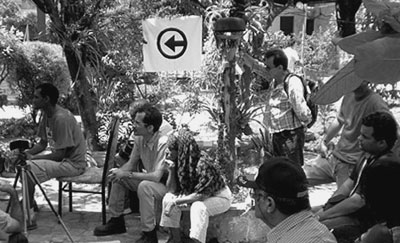 |
The holding of the Forum. |
 Second day
Second day
The second day of the Forum began with a discussion of political and legal institutions and the difficulties of the revolutionary project in Cuba. The debate has highlighted the urgent need to turn to an investment in all sectors of society. The topics covered range from the way it does the exercise of legislative initiative, direct democracy, the protection of citizens' rights, the search for alternatives to bureaucratic structures that dominate and weigh on the system, and popular control over the government and the public administration. It was also addressed and discussed social activism, commitment to the revolutionary forces, with the various issues related to the political program, the essential dialogue between different stakeholders, including the Forum is an open space, and the need to address acts of repression and obstruction. The Forum has now decided to create a space for presentation and discussion of a program, the "Proposals for the promotion of socialism in Cuba, where the authors propose a socialist path, based on a profound process of democratization and radical social relations of production.
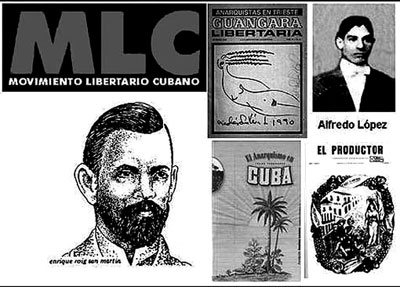 |
The libertarian historical presence on the island. |
In the discussion that followed the presentation of the "Proposals" it became clear that socialism requires the broadest range of freedom, with the possibilities and guarantees for the exercise of political and economic activities of individuals. This must not be seen as a single party, complete with a complaint, the predominance of state ownership of the means of production and living, behavior management and bureaucratic stagnation that have proven ineffective and anti-revolutionaries in Eastern Europe, among others.
The debate has also had his moment of poetic texts with a strong social critique.
The space was dedicated to the memory of two important events in the history of the revolutionary workers of the world. Events that correspond to the anniversaries of March: the Commune of Paris (France, March 1871) and Kronstadt (Russia, March 1921). Excerpts from the film by Peter Watkins' La Commune de Paris "were shown and has paid tribute to the Communards.
Daniel Pinos spoke recalling the causes of the uprising of the people of Paris, the libertarian nature of the practices of the insurgents, and the brutal repression that immediately after the intervention of the armed forces under the command of the bourgeoisie. About Kronstadt, has responded to various questions raised by the public of the characteristics of the anarchist movement and the initial program of the Soviets, who were born from the struggles of the Russian proletariat in the early twentieth century. This allowed us to highlight the liberating potential of revolutionary and social movements during such events. The memory of 'historical aspect and the theoretical discussion is complemented by a critical evaluation of the different projects and different areas of participation of citizens through a workshop that basically consists in sharing the collective experience of writing a book, produced after more than a year of meetings, interesting reflections on the issues raised, to bring out the social antagonism, press freedom, dialogue and the Cuban publishing field.
Like the day before, two important issues were discussed. First, the absence or inadequacy of local development projects in the face of deindustrialization that have dealt with many different communities and productive sectors in Cuba then, systematic violations that occur within the bureaucratic institutions because of lack of transparency and popular control from below, as well as the endemic lack of consistency between the views of officials in public statements, internal documents of the supervisory and opinions expressed in the work areas. These facts were verified from the discussion of two well-documented studies and a comprehensive analysis of public policies and proposals contained in draft guidelines prepared by a Commission for the Sixth Congress of the Cuban Communist Party.
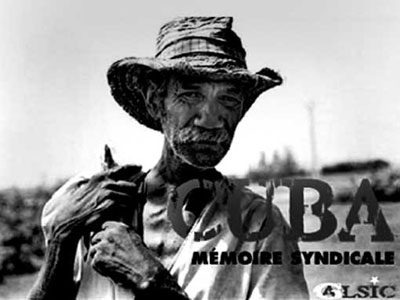
There was also discussion of how controversial the dissemination of information that Cuban society receives today from and of the world. And it became clear the production potential and the ability to use "open source" resources for the creation of non-commodified social relations, such as the need to limit the power of capitalist enterprises and organizations in the service of the state domain.
There was also participation in the Forum of two groups of artists. Chequendeque group of poetic creation, which perpetuates the memory of African ancestors and appeals to cultural fraternization between Cuba and countries of 'Africa and' Latin America through various initiatives of the spirituality and aesthetic expression.
One feature that is worth pointing out is that in this Forum there was an attempt to subvert the traditional roles of gender / class / status. The final statement was to praise the subversion of roles and encourage participants to participate more actively in future organizational practices. In order to eliminate the gap between policy makers and the smooth running of things, which is an important first step toward emancipation.
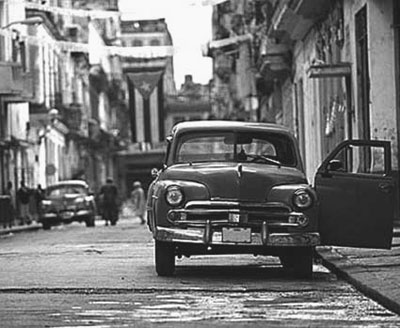 |
A street in Havana |
 The political context of Cuba today
The political context of Cuba today
52 years after the seizure of power by the rebel army and its commander Fidel Castro, Cuba is once again at a critical moment in its history, never in a time where the gap between younger and older generations in power is was so great.
"Emerging from the chaos without establishing the law of the jungle."
Thus the sociologist Aurelio Alonso summarizes the dilemma of Cuba
In a country in disarray, the market economic reforms of 1990 have destabilized the population and caused a further stratification. The population living in poverty in the city, whose basic needs are not met, rose from 6.3% in 1988 to 20% in 2000.
The middle class of urban and rural areas is reconstituted from the informal economy, self-employment and expansion of market mechanisms in the distribution.
In the informal economy, one can observe some activities that operate as small businesses, where it is possible to distinguish clearly the boss or employer, employees, housewives and even apprentices.
The social homogeneity and equality conquered at the beginning of the revolution are starting to be invalid, just as values embedded in society. Before the crisis, the universalization of social rights guaranteed the basic necessities, education, health, social security, employment and access to cultural heritage. The society had reached relatively high levels of equality and racial integration had progressed. The crisis has undermined the gains and tensions have increased. The new generations have only known the austerity of the "special period" (produced in 1991, by the collapse of the Soviet bloc) and a society that has nothing to do with that of their parents
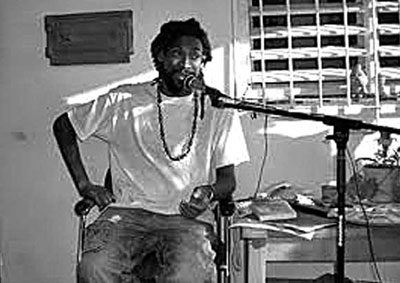 |
One speaker at the Forum. |
 The frustration of young people
The frustration of young people
While education was deteriorating, the teachers left their jobs for a profit given by private businesses are better paid, or exiled. Sometimes they are replaced by emerging masters, novice teachers, who received a short training. "Teaching is a disaster," shouted one audience member at a debate organized by the magazine Temas under the Convention of the National Writers and Artists of Cuba (UNEAC), echoing the response that had already noted the Director Festival of Latin American cinema Alfredo Guevara, denouncing "the absurd policies and practices that govern education." Where is the disinterest of many young people in politics? Young people are frustrated by the "exhortation" and "guidelines" expressed by executives daily. They feel they have no future to the relevant professional qualification gained, and many try to leave the island. In February 2008, during a face to face highly mediated, one student brought his grievances to the National Assembly president Ricardo Alarcon. Why do we need a permit to travel? Why Internet access is limited?
Publicly, it is recognized that the system is not working well, that wages are insufficient, it needs "structural change", Mr Raul Castro had raised many hopes. Urging his countrymen to participate in a great national debate, the new President had opened a space for the expression of dissenting views. Although it was never made public a summary of the debate, we know that the militants were in favor of a more participatory and democratic socialism. The population, essentially claiming improvements in daily life. We need to change. But what, when, how? What are we talking about? What are the differences? The activists, researchers, intellectuals and students are looking for an alternative form of socialism.
This research is accompanied by a critical review of "real socialism" and evaluate the situation after the fall of the USSR, whose analysis, however, was postponed "in order not to endanger the unity and not to give weapons to the opponent." But this is a "farce unanimously" Alfredo Guevara denounced "the conversion of ideas into rituals, in conversation, in ceremonies, frequent events in the history of bureaucrats and opportunists."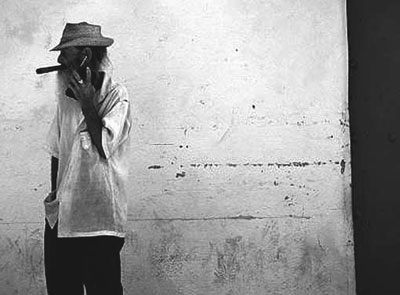
The Revolutionary Armed Forces (FAR) are indispensable. Raul Castro was the minister for nearly half a century, and it controls directly or indirectly, two thirds of the economy. Their business is the vector of many transformations, and the military who lead them have experienced capitalist management methods. There is the risk of developing an economic system with the risks associated with the phenomenal rise of China, faced with an unequal income distribution, poverty, a marked difference between urban and rural environmental degradation.
Since none of the leaders proposed policy changes, a growing desire for a participatory democracy, a self-managed socialism. The population critics the institutions too bureaucratic and requires greater participation of the social base. The party can no longer directly manage the state, is the people who must do it.
Libertarians are the main leaders critical of the Centre, are heirs to the ideals that marked the path of San Enrique Roig Martín, Alfredo López, Enrique Varona, Marcelo Salinas and many others. The critical Observatory part of the new landscape of social and cultural criticism in Cuba, alternative, dissident, that now exists on the island. Informal groups of young artists, musicians, scholars, are talking, reading, organizing cultural events, regardless of formal structures.
These forms of protest do not interest, obviously, the western media, or the media of the regime, who prefer not to talk about them. But they are another future, another possible Cuba ... Today is the duty of every libertarian and revolutionary of all to introduce and support by all means possible the work of the critic, in their transformation projects in Cuban society. Disseminate information, their texts, their reports on activities, support them by sending books with a social content that is not found in Cuba because of censorship, or any other form of material assistance.
Thanks to Octavio Alberola and Daniel Pinós for telling us about what you read.

